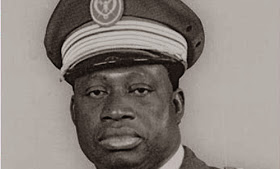
Burkina Faso is a landlocked country in West Africa. It covers an area of 274,223 km2 (105,878 sq mi), bordered by Mali to the northwest, Niger to the northeast, Benin to the southeast, Togo and Ghana to the south, and Ivory Coast to the southwest. As of 2021, the country had an estimated population of 23,674,480. Previously called Republic of Upper Volta (1958–1984), it was renamed Burkina Faso by President Thomas Sankara. Its citizens are known as Burkinabè, and its capital and largest city is Ouagadougou.

The Burkina Faso Armed Forces is the term used for the national military of Burkina Faso. The service branches of the armed forces include its Army, Air Force, National Gendarmerie and People's Militia. Being a landlocked country, Burkina Faso has no navy.

The history of Burkina Faso includes the history of various kingdoms within the country, such as the Mossi kingdoms, as well as the later French colonisation of the territory and its independence as the Republic of Upper Volta in 1960.

Blaise Compaoré is a Burkinabé-Ivorian former politician who served as the second president of Burkina Faso from 1987 to 2014. He was a close associate of the first president, Thomas Sankara, during the 1980s and in October 1987 he led a coup d'état during which Sankara was killed. Subsequently, he introduced a policy of 'rectification', overturning the leftist and Third Worldist policies pursued by Sankara. He won elections in 1991, 1998, 2005, and 2010, in what were considered unfair circumstances. His attempt to amend the constitution to extend his 27-year term caused the 2014 Burkinabé uprising. On 31 October 2014, Compaoré resigned, whereupon he fled to the Ivory Coast. In April 2022, he was found guilty by a special military tribunal of complicity in Sankara’s murder. He is also the longest-serving president of Burkina Faso.

Saye Zerbo was a Burkinabé military officer who was the third President of the Republic of Upper Volta from 25 November 1980 until 7 November 1982.

The Catholic Church in Burkina Faso is part of the worldwide Catholic Church, under the spiritual leadership of the Pope in Rome. According to the CIA Factbook, in 2018, 17% of the population are members of the Catholic Church.
Articles related to Burkina Faso include:
The Popular Revolutionary Tribunals were a system of courts, through which the workers and peasants of Burkina Faso were intended to be able to participate in and monitor the trials of criminals in the new Marxist–Leninist and pan-Africanist government of Thomas Sankara and his National Council for the Revolution. Among these were members of the previous government, corrupt officials, "lazy workers", and supposed counter-revolutionaries.
The 1982 Upper Voltan coup d'état took place in the Republic of Upper Volta on 7 November 1982. The coup, led by Colonel Gabriel Yoryan Somé and a slew of other junior officers within the military, many of them political radicals, overthrew the regime of Colonel Saye Zerbo. Zerbo had previously taken power just under two years prior to his own downfall.

On 15 January 2016, gunmen armed with heavy weapons attacked the Cappuccino restaurant and the Splendid Hotel in the heart of Ouagadougou, the capital of Burkina Faso. The number of fatalities reached 30, while at least 56 were wounded; a total of 176 hostages were released after a government counter-attack into the next morning as the siege ended. Three perpetrators were also killed. The nearby YIBI hotel was then under siege, where another attacker was killed. Notably, former Swiss MPs Jean-Noël Rey and Georgie Lamon were killed. Responsibility for the attack was claimed by Al-Qaeda in the Islamic Maghreb (AQIM) and Al-Mourabitoun.
In 2019, there were many attacks in the African country Burkina Faso on both soldiers and civilians. These are contextualized by the ongoing Islamist insurgency in Burkina Faso.
On 16 February 2020 a large group of gunmen attacked a Protestant service being hosted in the village of Pansi, Burkina Faso. Pansi, a rural village in Yagha Province in the Sahel Region of Burkina Faso, was targeted by terrorists who wanted to loot supplies and dissuade the local population from attending or supporting church services.

Since 2015, the border area between Burkina Faso, Mali, and Niger has been a hotbed for jihadist forces originating from Mali. The insurgency has taken place in two distinct regions of Niger. In southwest, the Islamic State in the Greater Sahara and the Nusrat al-Islam have carried out attacks in the tri-border area with Burkina Faso and Mali. Meanwhile, in the southeast, the Islamic State in the West African Province has established control in parts of southern Niger.

An ongoing war and civil conflict between the Government of Burkina Faso and Islamist rebels began in August 2015 and has led to the displacement of over 2 million people and the deaths of at least 10,000 civilians and combatants.

Paul-Henri Sandaogo Damiba is a Burkinabè military officer who served as interim president of Burkina Faso from 31 January 2022 to 30 September 2022, when he was removed in a coup d'état, by his own military colleague Ibrahim Traoré. Damiba had come to power just eight months earlier, on 24 January 2022, when he removed President Roch Marc Christian Kaboré in a coup.

An Islamist insurgency has been ongoing in the Sahel region of West Africa since the 2011 Arab Spring. In particular, the intensive conflict in the three countries of Mali, Niger and Burkina Faso has been referred to as the Sahel War.
On April 8, 2022, unknown jihadists ambushed a Burkinabe military base near the town of Namissiguima, in Sanmatenga Province, Burkina Faso.











